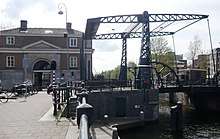Entrepôt
An entrepôt (English: /ˈɑːntrəpoʊ/; French: [ɑ̃tʁəpo]) or transshipment port is a port, city, or trading post where merchandise may be imported, stored or traded, usually to be exported again. These commercial cities spawned due to the growth of long-distance trade.[1] Such centers played a critical role in trade during the days of wind-powered shipping. In modern times customs areas have largely made such entrepôts obsolete, but the term is still used to refer to duty-free ports with a high volume of re-export trade. This type of port should not be confused with the modern French usage of the word entrepôt, meaning warehouse.

History
Entrepôts were especially relevant in the Middle Ages and in the early modern period, when mercantile shipping flourished between Europe and its colonial empires in the Americas and Asia. For example, spice trade in Europe, coupled with the long trade routes necessary for their delivery, led to a much higher market price than the original buying price. Traders often did not want to travel the whole route, and thus used the entrepôts on the way to sell their goods. This could conceivably lead to more attractive profits for those who were suited to travel the entire route. The 17th-century Amsterdam Entrepôt provides an example of such an early-modern entrepôt.[2]
Examples
Examples of specific entrepôts at various periods include:
Africa
Asia
|
Americas
EuropeOceania
|
References
- Pollard, Elizabeth (2015). Worlds TOgether Worlds Apart. W.W. Norton & Company. p. 343. ISBN 978-0-393-92207-3.
- Organized Markets in Pre-industrial Europe Archived 8 March 2008 at the Wayback Machine (draft chapter of The Origins of Western Economic Success: Commerce, Finance, and Government in Pre-Industrial Europe) – Kohn, Meir, Department of Economics, Dartmouth College, Hanover, 12 July 2003, p. 3